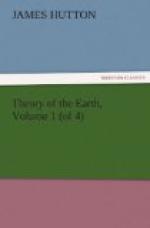So far as a theory is formed in the generalization of natural appearances, that theory must be just, although it may not be perfect, as having comprehended every appearance; that is to say, a theory is not perfect until it be founded upon every natural appearance; in which case, those appearances will be explained by the theory. The theory of gravitation, though no ways doubtful, was not so perfect before the shape of this globe had been determined by actual measurement, and before the direction of the plummet had been tried upon Shihallion, as after those observations had been made. But a theory which should be merely hypothetical, or founded upon a few appearances, can only be received as a theory, after it has been found to correspond properly with nature; it would then be held a proper explanation of those natural appearances with which it corresponded; and, the more of those phenomena that were thus explained by the theory, the more would that, which had been first conjectural, be converted into a theory legitimately founded upon natural appearances.
Matter of fact is that upon which science proceeds, by generalization, to form theory, for the purpose of philosophy, or the knowledge of all natural causes; and it is by the companion of these matters of fact with any theory, that such a theory will be tried. But, in judging of matter of fact, let us be cautious of deceiving ourselves, by substituting speculative reasoning in place of actual events.
Nature, as the subject of our observation, consists of two sorts of objects; for, things are either active, when we perceive change to take place in consequence of such action, or they are quiescent, when we perceive no change to take place. Now, it is evident, that in judging of the active powers of nature from the quiescent objects of our information, we are liable to error, in misinterpreting the objects which we see; we thus form to ourselves false or erroneous opinion concerning the general laws of action, and the powers of nature. In comparing, therefore, generalised facts, or theory, with particular observations, there is required the greatest care, neither, on the one hand, to strain the appearances, so as to bring in to the theory a fact belonging to another class of things; nor, on the other, to condemn a proper theory, merely because that theory has not been extended to the explanation of every natural appearance.




